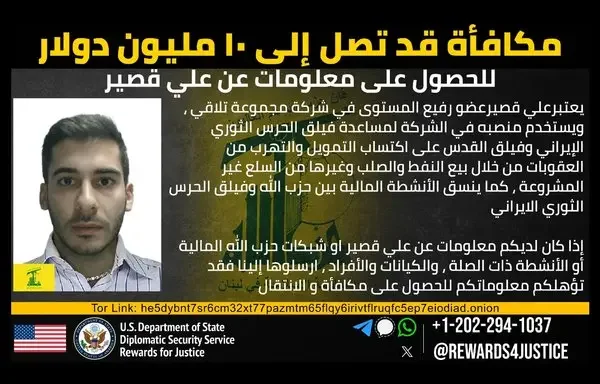Security
US offers $10 million reward to disrupt Hizbullah's financial networks
The US offers a reward for information on Ali Qasir, a key facilitator of the financial activities of the Quds Force and Hizbullah.

By Nohad Topalian |
The US State Department’s Rewards for Justice (RFJ) Program announced on September 23 a reward of up to $10 million for information leading to the disruption of Hizbullah’s financial mechanisms, with a particular focus on Ali Qasir.
Qasir was designated a Specially Designated Global Terrorist (SDGT) by the US Treasury Department in September 2019 for his ties to Iran’s Islamic Revolutionary Guard Corps–Quds Force (IRGC-QF).
He also serves as managing director of the Talaqi Group, a Hizbullah-linked front company used to finance the Quds Force’s oil shipments.
The US reward highlights the central role financial facilitators like Qasir play in sustaining Hizbullah’s activities, not only in Lebanon but across the wider region, experts said.
By targeting these individuals and entities, Washington hopes to weaken Hizbullah’s capacity to destabilize Lebanon and reduce Iran’s ability to use the group as a proxy force in its regional ambitions, they said.
"The financial rewards aim to disrupt Hizbullah’s global financial networks," Hassan Qutb, director of the Lebanese Center for Research and Consulting, told Al-Fassel.
"The latest of these is a $10 million reward for anyone who provides information about Ali Qasir, the main facilitator of the Quds Force’s and Hizbullah’s activities," he said.
"This will help degrade Iran’s financial network, diminish its influence in Lebanon, and contribute to stability in the Middle East," he added.
Weakening Hizbullah’s lifelines
For years, Hizbullah has relied on illicit activities and far-reaching financial channels to fund its operations.
Iran has worked systematically to make the group self-sufficient by creating businesses, financing merchants, and leveraging Shiite expatriates worldwide.
"It also recruited Shia expatriates for its political and religious project, establishing financial networks in South America and Africa that transfer cash to Hizbullah," Qutb said.
"The party has benefited from and used some of them to smuggle drugs and goods, forming a financial safety net that supports its destabilizing military activities in Lebanon and the region," he added.
Political writer Marwan al-Amin described these networks as "the main artery feeding Hizbullah, supporting its terrorist and military activities, and ensuring its survival."
The networks span several continents, including Latin America and Africa, where they engage in money laundering, drug trafficking, and other illicit trade to funnel millions of dollars back to Hizbullah, al-Amin said.
"When these networks, the individuals who run them, and their illegal activities are brought down, the malign influence of Hizbullah and the Iranian regime in Lebanon and the region will be weakened," he said.
Tips can be provided anonymously through the official website www.rewardsforjustice.net, via Signal, Telegram, WhatsApp at +1 202-702-7843, or Tor (Tor browser required) at: he5dybnt7sr6cm32xt77pazmtm65flqy6irivtflruqfc5ep7eiodiad.onion.